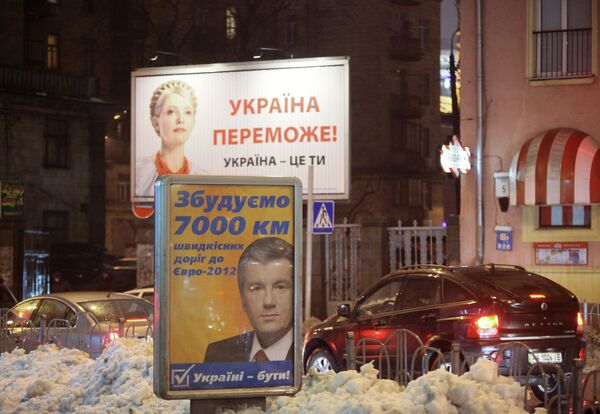The reaction of western countries to the first round of the presidential elections in Ukraine is a more interesting phenomenon than the elections themselves. Wishes and reality clash in the reports and editorials of Polish, British and U.S. newspapers.
Most analysts and politicians in Warsaw, Western European capitals and Washington would like to see Viktor Yushchenko's anti-Russian policy continue. But what can be done if, as reported by the Jamestown Foundation's chief Ukraine expert Taras Kuzio, 80% of Ukrainian citizens want friendly relations with Russia?
In addition, the newspapers cry out in unison that Yushchenko, having received less than 6% of the vote, is gone for good from big politics in Ukraine. This clearly did not happen at the last minute on account of his anti-Russian escapades.
One is forced to reconcile with the sad reality and look for compromises. Even such a staunch proponent of distancing Ukraine from Russia as Taras Kuzio writes that Yushchenko's accusations of the "Moscow coalition" (as he calls Yulia Tymoshenko and Viktor Yanukovych) are meaningless.
If even Taras Kuzio has stopped believing Kremlin spies are in the Ukrainian government, then there really has been a sea change. Kuzio soon discovered that Ukrainians themselves do not want a speedy induction into NATO, and not only Yanukovych supports keeping the Russian Black Sea Fleet in Sevastopol, but also Serhiy Tyhypko, who received 13% of the vote in the first round. All the newspapers report that such a good result makes Serhiy Tyhypko a kingmaker. The outcome of the elections depends on who Tyhypko and his supporters will back in the second round. After all, voters on the radical left (which will more than likely support Yanukovych in the second round) and Yushchenko's nationalist electorate cancel each other out.
Meanwhile, the British magazine The Economist has discovered to its horror that Tyhypko was head of Yanukovych's 2004 election campaign. The very same campaign in which Yanukovych "had the role of the Russian-backed villain."
Elementary logic must show The Economist's reporters that either Ukrainian voters have gone insane and are suffering from masochism or Yanukovych was not such a villain after all and his campaign was no more corrupt than the ensuing machinations of Yushchenko and Tymoshenko. And let's bear in mind that these machinations included despicable barbs in live broadcasts, an open struggle for control over the nation's "gas money," the president's dissolution of a democratically-elected parliament and open contempt for the county's largest minority.
Even though in a democratic country such exploits would put a stop to any political career, the western media are only now beginning to recognize that their favorites were obviously overzealous. A softer, more careful and lighter touch would have been more appropriate. A "gradual" approach would have switched out immediate acceptance into the EU and NATO, which were, say, characteristic for the Polish press four years ago.
This switching out of milestones does not in any way mean sympathy for Russia. Mistakes are being admitted only in terms of tactics, not strategy. The main topic for discussion is how not to lose hope for an anti-Russian Ukraine in the face of Yushchenko's defeat.
Differing opinions are starting to emerge. Most support Tymoshenko as the candidate who frequently openly manifested anti-Russian sentiments. For example, Taras Kuzio notes Tymoshenko's support in 2007 of legislation prohibiting any form of privatization of gas pipelines in Ukraine. Other observers propose that Yanukovych isn't so bad, gleefully citing the disappearance of Russian language instruction in Ukrainian schools and universities on his watch.
Western analysts do not question how all of these actions jibe with international agreements on the rights of minorities and the Energy Charter, of which Ukraine is a signatory and which specifically encourages privatization of pipelines. Only the U.S. publication The New Republic deigned to express the view that Tymoshenko is authoritarian and if she came to power she would dump the very democracy that she swore in 2004 on the Maidan (Kiev's main square) to uphold.
How can the people espousing these ideas in Washington, Brussels and Warsaw hope that not only the Ukrainian but the Russian public would believe in their rhetoric about democracy, minority rights and so on? Will they believe their talk of a brave new Europe - either without Russia and Ukraine or with Russia and Ukraine changed beyond recognition? Experience has shown that the result of a policy that ignores 400 years of history can only be pathetic. Conducting such a policy Europe (or more precisely, the European Union) risks losing both Russia and Ukraine.
The opinions expressed in this article are the author's and do not necessarily represent those of RIA Novosti.



